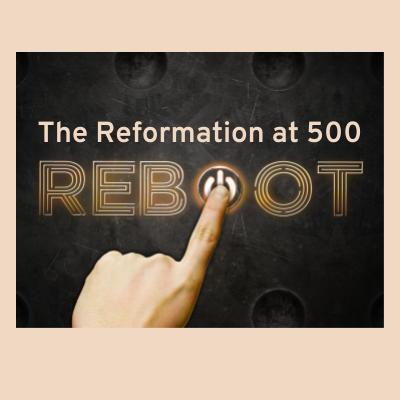SERMON SUMMARY
Over the centuries, Christianity got off-course. What started out as a shockingly simple story of God’s “search and rescue mission” of sinful humanity became an elaborate maze of man-made rules and regulations. Five hundred years ago a reformation of Christianity began. At the time, individuals such as you and I were not allowed to pick up a Bible, to read it, to learn about Christ, to repent and to believe. And common people such as you and I, they said, could not establish a relationship with God without a priest’s help—or permission! So, “Who decides what is true?”. This is a question of authority: who has the final say? And, how can we know that we’ve vested authority in the right place? What is “truth”? Is there such a thing as absolute truth in the religious realm? How should we respond to others when they claim that their views—which contradict our views—are the right way to think? These were the questions which sparked the Reformation 500 years ago, and we’re still asking them today!
In matters such as these—matters which lie beyond the five senses—the scientific method is of no use. If you can’t taste, see, touch, hear, or smell it—and if you can’t repeatedly measure it—then the scientific method cannot be used. Yet there is truth which lies beyond the five senses—truths regarding good and evil, kindness and harshness, love versus apathy, guilt and forgiveness. In order to answer the ultimate questions, we’re going to need an authority which lies beyond ourselves.
The Bible claims to be a love message directly from God to us (2 Pet. 1:3-4; Matt. 5:18). What is life? Does life come from God—or elsewhere? What is godliness? Can we achieve godliness, and if so, how? Those are about as “ultimate” as one can get. The Bible claims that God has given us everything pertaining to these ultimate issues. Now, the fact that the Bible claims to be true doesn’t make it true—we have to study the evidence to determine that (see today’s “Application-Challenge”).
Most Christians know that we claim that the Bible is true. But I’m afraid that many of us get tripped up by attacks such as: “There’s no way that a book written 2,000 years ago, by a bunch of pre-scientific flat-earthers, can possibly be authoritative for today!” or “There’s no way that Christianity can be the only way to God.” No evidence is given to support these claims. They’re simply stated as self-evident truths. And many Christians are cowed into silence when they hear statements such as these, stated with absolute conviction, yet without a shred of proof to back them up. They’re stated with such certitude and contempt that Christians just back down.
When it comes to answering the ultimate questions of life, neither the scientific method nor individual sentiments can give us an answer. If we’re to answer them, then the answers will need to come from God. Either we project our own ideas onto God or God reveals the truth to mankind. The former is called “mythology”; the latter is “theology”. No matter how sophisticated the ideas, when they originate with us, it’s just mythology. Today we still have rival religious mythologies—not only within the Christian traditions, but now also Islam, Hinduism, Buddhism, and many others. (Individuals construct their own mythologies, typically beginning with phrases such as: “I like to think of God as…” or “I don’t think God would ever…”) And now we’ve added scientific-sounding mythologies, including the“big bang” in which matter comes into being—from literally nothing! But it’s simply an illogical myth that something that had a beginning doesn’t need a cause.
In contrast to mythologies is the Reformation affirmation of “Sola Scriptura”—Scripture alone! We believe that the only solid foundation for answering ultimate questions is to let God tell us what’s really true, and we believe that God has told us in the Scriptures. Don’t allow the simplicity of this idea cause you to think that it’s a gimmick. If Stephen Hawking’s book, Neil de Grasse Tyson’s book, or Bill Nye’s book can have truth in them—and many people believe that they do—why can’t God’s book have truth in it?
Does the Reformation doctrine of “Scripture Alone” mean that we should not read any other books or listen to any teachers? Not at all—in fact, the Bible itself tells us to teach each another, and to receive teaching from each other (Col. 3:16). People need teachers and teaching. But the teaching needs to be an explanation and an application of what the Bible teaches (2 Pet. 3:16b). Many, many self-help books—including Christian ones—fall into this category. They’ll use Bible verses, but unless they place glorifying God as the goal of our entire lives, they are not teaching the Bible. “Sola Scriptura” also means that there’s nothing better than God’s Word (1 Pet. 2:2-3).
APPLICATION / CHALLENGE
- Know the evidence for the uniqueness, reliability, and authority of Scripture. Review “Foundations of the Faith” (go to tcc.org click on MEDIA then Sermons, and search for January 22 & 29, 2017). Also buy and read Josh McDowel’s The New Evidence That Demands a Verdict.
- Decide to trust the Bible rather than man’s opinions. Both require faith—so choose God over man. Living in obedience to God’s Word is the way that we express our love to God.
- Study Scripture daily and then evaluate everything you hear by one single standard: “What does Scripture say on that subject?”
TAKE ONE STEP
Each week, identify and write down one, concrete step of obedience, small or large but doable, that you will put into practice this week. (James 1:22: “But prove yourselves doers of the word, and not merely hearers who delude themselves.”)


